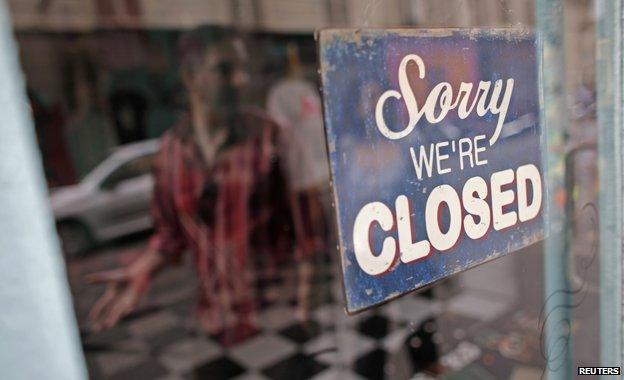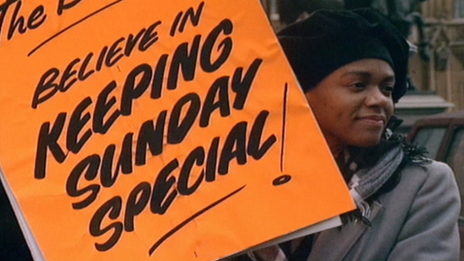UK v France: The Sunday shopping difference
- Published

Almost twenty years ago, a bitter war was fought over the future of Britain's Sundays - and today France is mired in a similar battle. But how has shopping on a Sunday re-shaped British society and do the French really have anything to fear?
In November 1993, protesters from across much of the UK (although not Scotland) were confident they could keep big shops closed on Sundays.
Outside Parliament they raised placards reading "Don't give in to supermarket greed" and "No government can change the laws of God".
Things always appeared very different across the Channel. The French had always seemed to grasp the notion of work-life balance - in British imagination at least, reserving their weekends for red wine and serene lunches.
Not everybody in the UK shared that desire for a day of rest, however. "About 50 years ago Sundays were completely dead," says Joe Moran, a cultural historian.
Once, pubs had to close between 3-7pm on a Sunday, and theatres and cinemas were closed altogether. Those rules were steadily relaxed in the years that intervened, but by the early 90s most shops were still banned from trading on Sundays.

Michael Schluter, founder of the Keep Sunday Special campaign, wanted to keep it that way, and lobbied MPs to support his movement. In December 1993, a vote in the House of Commons saw Schluter's vision defeated by just 18 votes. The following year all restrictions were removed from small shops, and those "over 280 square metres" in size were allowed to trade for six hours each Sunday.
Today you only need to stand in a DIY superstore in a desolate retail park on a Sunday morning to see how things have changed. Customers gather in the store in the half-hour "browsing time" before the tills open, glancing over expectantly, ready to pounce. Their day is built around a visit to a big shop.
"It's fairly obvious that Sunday is a huge trading day in this country in spite of the fact that it's limited to six hours," says Richard Perks of market research firm Mintel.
The British Retail Consortium says it is second only to Saturday for footfall and total sales - and is the biggest day in terms of hourly sales, as customers try to squeeze their shopping into the six hour window.
While the UK has opened its shops on Sunday since 1994, the French have managed to keep most of theirs closed.
It's easy to conjure up a vision of a stereotypical French Sunday and imagine families hiking through the Fontainebleau forest, cycling to the Bois de Boulogne park, or rounding off their poulet roti with a freshly baked tarte aux fraises.
But now 20 years after the British battle was settled, a similar quarrel is bubbling in France, where different groups of workers take to the streets of Paris to argue both sides of the case. Its tangled web of regulations has been dubbed a "millefeuille" by the press - after the intricate, multi-layered, French pastry of the same name.
Shops in designated tourist zones can open, as can garden centres and small owner-operated shops. Those selling food are permitted half a day's trading. For the most part, though, major retailers are forced to close all day, which has angered many business leaders, and some of their workers too.
Castorama and Leroy Merlin - two major French DIY chains - have chosen to defy the ban, opening their doors to shoppers on the day of rest, and their employees have backed them. They have held "Yes Weekend" demonstrations to argue for their right to work.

In the UK, there seems to be a particular link between Sunday leisure and home improvement.
On a typical British Sunday, streams of family cars wait patiently for a space beneath IKEA's blue and yellow facade, trundling out hours later with open boots tied down by rope.
It isn't just shopping that has turned Sundays upside down. The proliferation of televised sport has also contributed to a steady erosion of the distinction between the first and second days of the weekend. Schluter is convinced that the UK has lost something along the way, however.
Besides small shops that have suffered from increased competition, family ties have been damaged too, he says. "There's a psychological shift which is hard to pin down or measure… towards an attitude that is less about the value of people and relationships and more about material goods."
But the example of the British reforms is an inspiration to some French campaigners. Jerome Dubus of MEDEF, a consortium of French business leaders, says that reforms are overdue. "We are one of the last countries that haven't allowed Sunday work, we are behind as usual. I was a student in England 30 years ago. On Sundays everything was closed, there was nothing going on, we didn't know what to do, and the English were attached to it. But now it has changed a lot."
Of course, the unions disagree. Christophe Le Comte, of Force Ouvriere, says that the move is just another example of employers trying to exploit their staff. "They are increasing the length of the working day, they are pushing back the age of retirement," he says. Le Comte bemoans the lack of employment protection in the UK and says Sunday trading had "disastrous consequences" for small businesses in the UK.

Protestors marching in favour of Sunday trading
Some change looks likely. The French government has now commissioned a review into the regulations, but whether it will endorse wholesale reform or add more layers to the pastry is difficult to know.
Anne-Elisabeth Moutet, a French columnist for the British Daily Telegraph, thinks the unions are projecting a romantic notion of life in the country that is essentially a fiction.
"They describe a kind of idealised France of the 1950s in which everybody has got 2.3 children, and a dog, and a little house, and the children organise Sunday lunch for all members of the family.
"But half the households in large cities are single person households… so what they're describing is something that doesn't exist anymore."
Trish Deseine, a food writer in Paris, has a very different outlook, and the city she describes will still sound appealing to the UK's Keep Sunday Special campaigners, who are still campaigning.
"If you walk by Montparnasse, you will see big family reunions in the restaurants," she says. "There is a definite distinction between Sunday and the rest of the week. There is a sense of occasion. It is quieter and more family oriented. I really hope it stays this way."
She does not think the restrictions can last forever, but seems determined that change should at least be delayed.
"Eventually France will have to come around. The French are dragging their heels into a modern way of life, but I think it is a good thing that we are standing against it."
You can follow @BBCNewsMagazine, external on Twitter and on Facebook, external.